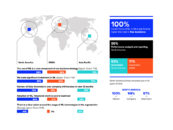
These Are The 13 Fintech Companies to Watch in Singapore in 2019
by Fintech News Singapore December 3, 20182019 is right around the corner, which means we are near the end of an eventful year of fintech in Singapore. The Singapore Fintech Festival was probably the biggest one here yet, and the Monetary Authority of Singapore (MAS) has made some definitive pushes into big data, artificial intelligence, and the launch of an ASEAN-wide API to answer the global demand for open banking principles.
More recently though, MAS has given an idea of their plans for the future, with a US$5 billion (SG$6.91 billion) worth private market programme allocated as its investment portfolio into the private markets asset class—a move by MAS to anchor global asset managers into Singapore and catalyse more growth in that sector of Singapore.
MAS has also announced a “Sandbox Express” to complement its existing sandbox, which are pre-defined sandboxes so that fintechs can conduct their experiments more quickly than the existing measures.
And all of this does not yet venture into the often volatile, but always interesting startup sector. Fintechnews has identified 13 promising Singapore based Fintech companies which will shake 2019’s direction and purpose, one way or another. (see our selection from 2018 here)
BetterTradeOff
BetterTradeOff, a homegrown company, presented a holistic life-planning solution named Aardviser, which uses advanced statistical models and AI to help individuals make better decisions when attempting to finance their future. This flexible, modular, white-label solution can capture a client’s financial situation, digitise the traditional data capture with financial advisors, and reduce the time taken for a financial health check to a matter of minutes.
It can dynamically adjust the financial plan of the client via investment products based on financial ambition such as supporting children’s education, purchase of property and readjust after life triggers such as loss of income.
AutoWealth
Following an intensive beta testing period, along with a multi-million dollar valuation and onboarding hundreds of clients since its licensing, AutoWealth recently launched a robo-advisor that is said to mimic a human financial planner.
The robo-advisor automates investing and provides comprehensive investment portfolio rebalancing and management for retail investors. The programme uses a proprietary algorithm to provide financial advice and investment management online. It has created an automated process that cuts down on the processing time and middleman costs while still giving customers customised recommendations on the ideal composition of their investment assets, the initial sum to invest and the periodic investment instalments.
Sqreem
Founded in 2010, Sqreem has a presence in 40 countries and 12 industries, and using their proprietary technology, they didn’t need to know anything about these industries to stake out a presence. This is because the company has been able to create an AI platform that is able to grasp behaviour, context, and logic at levels and scales that the company claims are beyond human capability.
This is because the company utilises nonlinear pattern recognition technology using signals-intelligence algorithms. This means the programs are able to identify links and associations among vast, unstructured digital activities across any platform regardless of format and language, and determine macro-behavioral normalcy versus micro-behavioral abnormality. The company won SG$100,000 thanks to placing on the Singapore Fintech Festival awards.
Finantix Asia Pacific
Finantix enables clients like banks, insurers, wealth managers and financial advisers to digitalise their multi-channel and omni-device strategy by offering flexible component-based solutions that can slot into an organisation’s existing infrastructure and digital strategy.
Finantix’s offering is based on a library of modules and components designed for the financial services industry.
In March, they acquired the startup SmartFolios the creators of quant-enabled investment tools that support the key stages of the digital advisory value chain. This allowed the company to combine forces and launch an AI offering that incorporates Smartfolios quantitative analysis solution to create a wealth management platform with real-time thematic-style analytics.
Accuity
Accuity is part of RELX Group, and they provide a series of regtech solutions, from data and innovations software that controls risks and compliance, to tools that are said to be accurate and flexible in optimising payments processes.
Its products include Fircosoft, Bankers Almanac and NRS.
They announced that they acquired Safe Banking Systems (SBS) in July, a provider of enterprise-wide Know Your Customer due diligence and anti-money laundering solutions. Their solutions offer false positive reduction and risk assessment screening for banks and other financial institutions.
Cardup
Cardup is a proponent for the cashless society, but with cards in mind instead of the more typical e-wallets that come to mind today. Cardup allows individuals to manage large recurring payments with an online service that allows payments made by bank transfer to be shifted to a credit card, regardless of whether recipients merchants allow for credit card payments.
This allows customers to better utilise their benefits, like extended credit card terms and earning rewards points for transactions like paying rent or taxes, and recipients do not need to expend any payments to enable credit card transactions.
Earlier this year, the company received SG$2.2 million (US$1.7m) in funding led by Sequoia India and SeedPlus in order to grow its payments and cash flow management offering to the SME segment.
Bambu
Using developments in artificial intelligence and neural networks, Bambu developed a robo-advisor which it claims can identify hidden insights in financial data, and formulate an investment strategy in response.
Bambu gets data from providers with a standing, like DriveWealth and Thomson Reuters, while offering its services for a lower cost than real life financial advisors. Its services are available to banks or wealth managers.
Beyond Singapore, Bambu was a winner at Fintech Innovate Africa for its “goal-based, white label robo-advisor offering that gives investors a natural and effortless experience in finding the right investment strategy for their client’s needs”. Besides Singapore, the company has a presence in Hong Kong and the United Kingdom.
Revolut
This company is the first entry on this list that did not technically originate in Singapore, but they are making a strong foray into the region. Revolut is a neo-bank that allows users to use an app to spend overseas in over 150 countries without fees or holds, and allows users to exchange 24 different currencies in-app. Revolut is also a remittance service that aallows domestic and international money transferes with the real exchange rate.
The company reported that 100,000 customers were on their waiting list from Singapore and Japan collectively. And they have just received a license to run their services in Singapore slated for the first quarter of 2019.
Furthermore, Revolut’s Asia Pacific headquarters will be stationed in Singapore, and the company has even gone on a hiring spree to make this happen.
Grab
Primarily known as a ride-hailing service, Grab has been making a strong push into fintech, beginning with issuing its own e-wallet GrabPay. With it, Grab has linked its over business avenues, even its ride-hailing side, to the e-wallet as well as expressed aspirations towards producing a “super-app”.
Grab announced that it will be launching remittance services both local and international, beginning in 2019 as its most recent confirmed expansion of Grab Financial—the fintech arm of Grab which would eventually offer insurtech data-collection, as well as micro-loans.
Razer
Razer is another traditionally un-fintech household name making their own venture into fintech, and it has a lot of similarities with Grab. Not only is Razer and Grab both affiliated with UOB, both are also in the midst of exploring cross-border remittance—though Razer is doing so via blockchain.
Currently, RazerPay is collaborating with the Finlab to create a proof-of-concept for testing cross-border remittance using blockchain.
Razer has a slew of other partnerships, but an interesting one is its collaboration with NETS Group, which would enable RazerPay acceptance on NETS’ unified POS terminals. This would hopefully enable full interoperability for RazerPay’s launch in Singapore by early 2019.
CCRManager
CCRManager is a wholly owned subsidiary of Tin Hill Capital Pte Ltd, and supported by the Monetary Authority of Singapore through the Financial Sector. They invest in and operate technology platforms and financial solutions for the global trade and working capital industry. Services include Trade Asset Management, a module that facilitates buying and trading assets among financial institutions, and Correspondent Services, a module that digitally facilitates various documentation processes.
Cynopsis Solutions
Cynopsis Solutions designed Artemis, an intuitive, cost-effective one-stop automation of a complex regulatory requirement on Know-Your-Customer (KYC) / Anti-Money Laundering (AML) / Counter-Terrorism Financing (CTF). Artemis is built specifically to address the ever-changing AML/CTF requirements prescribed by regulators in Singapore and elsewhere and is intended to be used by Financial Institutions, Corporate Services Providers, accountants, and lawyers to assist them better comply with regulatory requirements.
Thin Margin
This Singaporean online money changer claims to be the biggest in the island nation. Thin Margin allows individuals to buy currency at, well, apparently thin margins, and will deliver the currency to users without the need for queuing up.




















